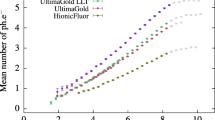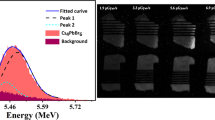Abstract
THE scintillation spectrometer1 using a sodium iodide crystal (thallium-activated) identifies the incident gamma-ray energy with the response to the photo-electric, Compton and (when energetically possible) with the pair-production processes within the crystal. In sodium iodide, the photo-electric cross-section is predominant below about 0.2 MeV. and the pair-production process becomes appreciable above about 2.5 MeV. In the energy-range 0.2–2.5 MeV., the photo-electric and Compton processes are in competition. Thus, the recorded spectrum in this important range is complicated by the two-fold response of the spectrometer to each gamma-ray line.
This is a preview of subscription content, access via your institution
Access options
Subscribe to this journal
Receive 51 print issues and online access
$199.00 per year
only $3.90 per issue
Buy this article
- Purchase on Springer Link
- Instant access to full article PDF
Prices may be subject to local taxes which are calculated during checkout
Similar content being viewed by others
References
Hofstadter, R., and McIntyre, J. A., Phys. Rev., 80, 631 (1950).
Phys. Rev., 78, 619 (1950).
Albert, R. D., Rev. Sci. Instr., 24, 1096 (1953).
Author information
Authors and Affiliations
Rights and permissions
About this article
Cite this article
PEIRSON, D. A Two-Crystal Gamma-Ray Scintillation Spectrometer. Nature 173, 990–991 (1954). https://doi.org/10.1038/173990b0
Issue Date:
DOI: https://doi.org/10.1038/173990b0
This article is cited by
-
Schnelle Bestimmung von radioaktivem Tellur in Jodpräparaten-131J
Fresenius' Zeitschrift für analytische Chemie (1963)
-
γ-Spectrometry compensated for the Compton Effect
Nature (1962)
-
Two-crystal scintillation spectrometer with pulse summation
Czechoslovak Journal of Physics (1958)
Comments
By submitting a comment you agree to abide by our Terms and Community Guidelines. If you find something abusive or that does not comply with our terms or guidelines please flag it as inappropriate.



